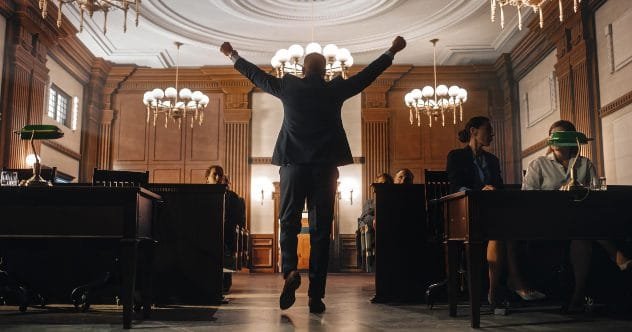The courtroom drama often spills beyond its walls, especially when a verdict leaves the public stunned. We’ve all heard that justice is blind, but sometimes, what’s proven in court feels worlds apart from public perception. Get ready to dive into ten famous cases where the defendants were acquitted, sparking debates that continue to this day.
10 Casey Anthony
The disappearance of two-year-old Caylee Anthony in 2008 gripped the nation. Her mother, Casey Anthony, initially spun a web of lies about her daughter’s whereabouts. A month after Caylee was last seen, Casey’s mother reported her missing, noting a disturbing smell in Casey’s car, like that of a deceased person. Sadly, Caylee’s remains were found near the Anthony home months later.
Why They Were Acquitted
In 2011, a jury found Casey Anthony not guilty of first-degree murder, aggravated child abuse, and aggravated manslaughter. She was, however, convicted on misdemeanor counts for providing false information. Jurors later explained that while Casey seemed like a “horrible person,” the prosecution didn’t present enough concrete evidence to prove her guilt beyond a reasonable doubt. The case highlighted the high bar for conviction in serious criminal charges.
9 Belva Gaertner
Chicago, 1924: Walter Law was discovered dead in Belva Gaertner’s car, a gun and a gin bottle beside him. Gaertner, a cabaret singer, was later found at her apartment with bloodied clothes. She admitted to being with Law and having a gun but claimed she couldn’t recall the night’s events clearly.
Why They Were Acquitted
Belva Gaertner’s defense was simple: she couldn’t remember what happened. Her lawyer portrayed her as a charming, fashionable socialite who couldn’t possibly commit such a crime. The all-male jury seemed swayed by her persona and acquitted her. This case, along with another from Chicago’s “Murderess Row,” inspired characters in the famous musical Chicago.
8 William Kennedy Smith
In March 1991, William Kennedy Smith, nephew of Senator Ted Kennedy, was accused of rape by Patricia Bowman. The alleged incident occurred at the Kennedy family’s Palm Beach estate after they met at a bar. Bowman claimed Smith attacked her on the beach.
Why They Were Acquitted
After a brief deliberation of only 77 minutes in December 1991, Smith was acquitted. His defense team successfully argued that Bowman had fabricated the rape accusation, suggesting she was trying to extort money from the wealthy Kennedy family following consensual sex. The verdict was controversial, especially since other women who alleged assault by Smith were not permitted to testify, and one juror later married the lead defense attorney.
7 Harry K. Thaw
On June 25, 1906, wealthy Pittsburgh heir Harry K. Thaw shot renowned architect Stanford White in front of hundreds at Madison Square Garden. Eyewitnesses heard Thaw exclaim, “I did it because he ruined my wife!” The ensuing “Trial of the Century” captivated the public.
Why They Were Acquitted
Thaw was found not guilty by reason of temporary insanity after two trials. He was then committed to a hospital for the criminally insane. The real power behind his acquittal was arguably money. His mother reportedly spent a fortune, including $500,000 on doctors, to support the insanity defense and protect the family’s reputation. Thaw himself believed his actions were justified.
6 Eadweard Muybridge
In 1874, pioneering photographer Eadweard Muybridge was charged with murdering Major Harry Larkyns, his wife Flora’s lover. Flora, much younger than Muybridge, had an affair with Larkyns while Muybridge was away. Muybridge discovered incriminating letters and a photo of his son labeled “Little Harry,” leading him to doubt his paternity. He confronted and shot Larkyns.
Why They Were Acquitted
Muybridge’s defense argued temporary insanity. However, the jury acquitted him on the grounds of “justifiable homicide.” They essentially decided that while killing was illegal, it was understandable for a man to kill his wife’s lover. This verdict reflected the societal norms of the era, where a man’s honor was paramount.
5 Lorena Bobbitt
The 1993 case of Lorena Bobbitt became a media sensation. She was charged with malicious wounding after severing her husband John’s penis with a kitchen knife. Lorena testified that she had endured years of physical, emotional, and sexual abuse from John, culminating in him raping her the night of the incident before he passed out.
Why They Were Acquitted
Lorena Bobbitt was found not guilty by reason of temporary insanity. Her defense successfully argued that the years of abuse had driven her to an irresistible impulse. The jury agreed, and she was required to undergo a 45-day psychiatric evaluation. John’s penis was surgically reattached.
4 Sam Sheppard
Dr. Sam Sheppard, an osteopathic physician, was convicted in 1954 for the brutal murder of his pregnant wife, Marilyn, in their Ohio home. Sheppard maintained his innocence, claiming a “bushy-haired intruder” committed the crime. His trial was subject to intense media scrutiny, which he argued prejudiced the jury.
Why They Were Acquitted
In 1966, the U.S. Supreme Court overturned Sheppard’s conviction, ruling that the pervasive pretrial publicity had denied him a fair trial. He was retried later that year and acquitted. This fascinating case is also said to have loosely inspired the TV series and movie The Fugitive.
3 John Hinckley, Jr.
In 1981, John Hinckley, Jr. attempted to assassinate U.S. President Ronald Reagan in Washington, D.C. He also wounded three others in the attack. Hinckley claimed his actions were an attempt to impress actress Jodie Foster, with whom he had developed an obsession after seeing her in the film Taxi Driver.
Why They Were Acquitted
Hinckley was found not guilty by reason of insanity. His defense team argued that his mental illness and obsession with Foster drove him to recreate elements from Taxi Driver, including an assassination attempt. Public outrage following the verdict led to significant reforms in laws regarding the insanity defense, making it a much more difficult plea to use successfully.
2 O.J. Simpson
The 1994 trial of O.J. Simpson for the murders of his ex-wife Nicole Brown Simpson and her friend Ronald Goldman was dubbed the “trial of the century.” The former NFL star and actor’s case garnered unprecedented media attention. His defense team, famously led by Johnnie Cochran, delivered memorable courtroom moments, including the line, “If it doesn’t fit, you must acquit,” referring to a bloody glove found at the crime scene.
Why They Were Acquitted
Simpson’s lawyers argued that police had mishandled evidence and that reasonable doubt existed about his guilt. The jury acquitted him of the murder charges. However, Simpson was later found liable for their deaths in a civil suit. Years later, he served nine years in prison for unrelated charges including kidnapping and armed robbery.
1 R. Kelly
In 2008, R&B superstar R. Kelly faced trial on 14 counts of child pornography. The case centered on a videotape allegedly showing Kelly engaging in sexual acts with an underage girl. Despite years of rumors and controversial song lyrics, this was a major legal challenge for the singer.
Why They Were Acquitted
Kelly’s defense team argued that the person in the tape was not Kelly and that the girl depicted was not underage. The jury found him not guilty on all charges. However, justice eventually caught up. In 2021, Kelly was convicted in a separate federal trial on charges of racketeering and sex trafficking, finally holding him accountable for decades of abuse.
These cases remind us that the legal system, with its rules of evidence and burdens of proof, can sometimes lead to outcomes that surprise or even anger the public. What’s considered “beyond a reasonable doubt” in a courtroom can be very different from popular opinion.
Which of these verdicts do you find most surprising? Share your thoughts in the comments below!










